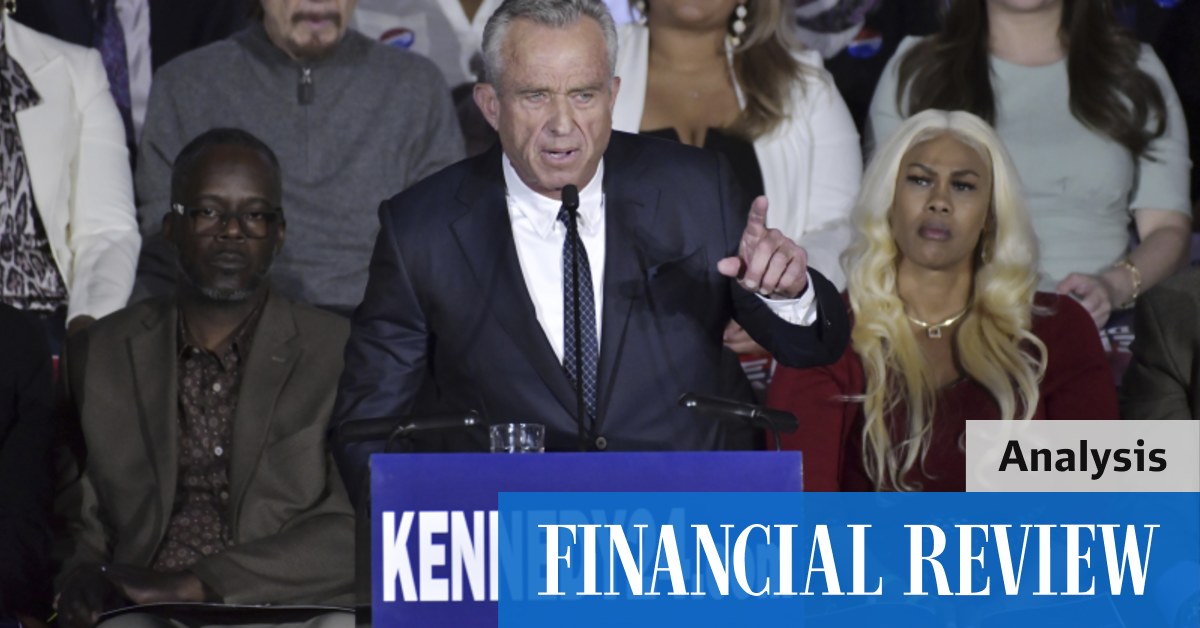Robert F. Kennedy jnr’s heady cocktail of Camelot and conspiracy

And yet – not that many Americans would care to admit – this hankering for a lost past, especially in a country founded on its New World vision, is consistent with what other leaders around the world are saying.
For every Trump speech about restoring America’s greatness, for every Biden aim to restore pre-Reagan era factory settings, for every Robert F. Kennedy promise to bring back the “awesome vitality of the original Kennedy era”, there lies a Putin lamenting the collapse of the USSR, a Xi decrying a century of humiliation, a Modi stoking Hindu nationalist sentiment, or a Johnson ponying up for the faded glory of “global Britain”.
The arc of conspiracy
Kennedy is of course seemingly oblivious to how the supposed cool realism and liberal humanism of the “best and the brightest” surrounding his uncle, John F. Kennedy, landed America in the quagmire of Vietnam. His credibility here is as thin as the diameter of the skinny ties he wears, themselves a fashion hallmark of the 1960s.
The point is that his capacity to stretch the arc of conspiracy from the tragic assassinations of his uncle and father to the present moment gives an already storied Kennedy narrative a particular edge, if not power, in a collective psyche licking its wounds from 9/11, Iraq, the GFC and Trump.
In the world of RFK jnr, this is 1960 and 1968 all over again, when his uncle and then father first ran for the White House. But Kennedy is struggling to surround himself with the kind of court and counsel that sat at the feet of JFK and RFK.
This candidate plunders at will Camelot’s historical treasure chest and then denies that HIV has anything to do with AIDS, claims that vaccines produce autism, and compares COVID-19 restrictions to the Third Reich. “Even in Hitler’s Germany,” he said, “you could cross the Alps to Switzerland. You could hide in an attic like Anne Frank did.”
That comment brought the swift condemnation of many, including his wife. Kennedy has even met with the man who assassinated his father in Los Angeles, convinced there was a second shooter on that fateful night at the Ambassador Hotel.
Kennedy has a particular penchant, too, for doubting election campaign results, claiming that John Kerry, not George W. Bush, won in 2004. And when asked about the 2020 race, his reaction was equivocal: “I don’t know, I think Biden won.”
Kennedy’s interminable speeches and lengthy podcasts make the oft-heard cry of those believing the system to be stacked against them look like a mild bureaucratic complaint.
Is it any wonder, then, that one of the key Republican donors to Donald Trump’s past presidential campaigns, Timothy Mellon, is now, along with other conservatives, pouring cash into Kennedy’s campaign coffers?
Like Trump, Kennedy says the country has been “ruined by 40 years of offshoring”. Like Trump, he wants to reduce immigration and close the southern border with Mexico. Kennedy receives the ultimate accolade from Trump for these policy positions: the Donald praises him for his “commonsense”.
His foreign policy views too carry more than a Trumpian tinge: the country is in the grip of a CIA-fed military-industrial complex, and he wants to drastically cut defence spending, furious that the promise made to the American people following the end of the Cold War – that the military budget would fall significantly – was left unfulfilled.
He argues that China does not seek military competition with the US, and that when it comes to the fate of Taiwan, he advises “let’s let Taiwan and China work out that issue on their own, and back off militarily”.
The Ukraine war he frames as the “creation of a relentless mentality of foreign domination on America’s part”. America’s foreign policy elite, he says, “wanted war as part of their strategic grand plan to destroy any country such as Russia that resists American imperial expansion”. He believes he can “fix” a broken CIA, an institution about which he has been thinking “for most of my life”.
Much of this worldview, ironically, reflects the so-called “new left” view of America’s role in the world that came to prominence at the time of the Vietnam War. These commentators and historians argued that the US, in carrying out its mission to redeem humanity, had instead pursued imperial hegemony, creating an informal empire to gain control of markets and exploit weaker nations.
And they argued that if this policy was not changed it would cause a reaction against the United States. They saw this as a departure from the true American ideals inherited from the revolution of 1776, and so wanted to call Americans to recognise the errors of their ways and return to their true selves.
So Kennedy is channelling more of the 1960s than he might otherwise care to admit. This heady cocktail of Camelot and conspiracy may not make it all the way to the White House, but it will still unnerve watchful US allies worried about American political dysfunction.
James Curran is the AFR’s international editor and professor of modern history at Sydney University.
This article has been archived for your research. The original version from The Australian Financial Review can be found here.


